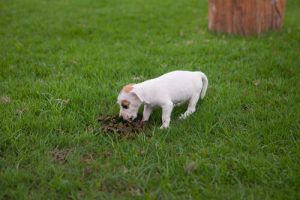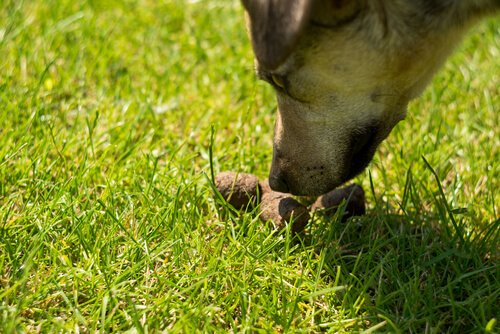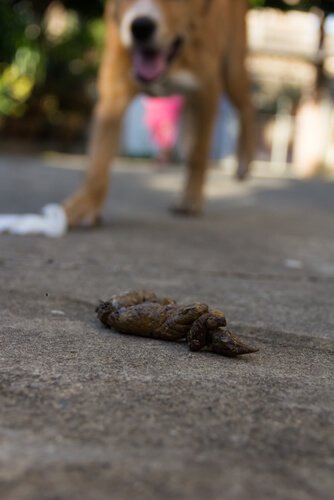Treatment for Coprophagy


Written and verified by the lawyer Francisco María García
The act of eating feces is a harmful behavior for dogs because it will cause health, eating or behavioral problems.
Coprophagia is a common canine behavior that’s quite unpleasant to humans. It takes paces when a dog eats feces, either his own or that of others. Why do they do it? How do you to treat coprophagia?
The causes of canine coprophagy
There are several theories about why dogs might practice coprophagia. Information provided from the owner will help determine what should be done to prevent him from eating feces, among other things, because this practice can damage the dog’s health.
Medical causes
Coprophagy may take place due to health problems in dogs. For example, dogs may do it when they have pancreatitis, intestinal infections, excess fats in their diet or when they are having difficulty absorbing nutrients.
Apart from having coprophagy, there will be other symptoms, especially diarrhea because it’s the most common. On occasion, dogs will have anorexia, bad breath and considerably increase their consumption of water.
Behavioral causes
A dog can start practicing coprophagy due to medical reasons. However, once he is back to good health, he may continue doing it in order to get his owners’ attention.
Sometimes, dogs practice coprophagy out of imitation. This mostly happens with young dogs because when they see their owners picking up feces, they understand that they should make them disappear by eating them.

Likewise, a dog can imitate this behavior from other dogs eating feces. If there is more than one dog in your home, one of them might be eating the stool of another as a sign of submission.
Female dogs that just have given birth tend to eat the feces of their puppies. This is a normal behavior and part of a female dog’s maternal instinct. They do this to keep possible predators away that might pick up the scent that comes from the litter’s feces.
Food
A poor diet is another possible reason for canine coprophagy. If the food you give to your dog does not meet the dog’s nutritional requirements, he will try to compensate for this by eating feces. If the dog is fed once a day, he may want to ease his hunger by eating stools.
Treatment for canine coprophagy
First, if the dog has a habit of eating feces, so the first thing to do is to go to the veterinarian to dismiss a medical cause. If there is a medical cause, the vet will prescribe your dog an appropriate treatment.
If the cause is dietary, the owner should make sure to give his pet high-quality, balanced food that meets all his nutritional needs and contains the correct amount of fiber and fat.
In several cases, it is also important to increase the number of daily meals. It is a good idea to divide the ration into two or three portions throughout the day.

If the dog is healthy, then the cause is behavioral and the owner must figure out a way to stop the pet from continuing this harmful behavior.
You have to collect the feces immediately without the dog seeing you do it, so he will not want to imitate you. If your do is eating cat droppings, then you should keep the kitty litter tray clean.
If the animal practices coprophagy during walks or when he is alone in the house, it may be a good idea to have him wear a muzzle. When it comes to coprophagy in puppies, you should wait until the dog grows up and stops doing it by himself.
It is always advisable to avoid punishing him. On the contrary, positive behavior must be reinforced with treats. When the dog is about to eat feces, you should distract him with a ball or another toy and congratulate him when he responds correctly.
Canine behavior specialists recommend adding certain substances to foods that make the taste and smell of the excrement disgusting to the animal.
There are substances that can be sprayed on stools, which is a good preventive measure. Some of these products are spicy or have an unpleasant odor for dogs. Before using these alternatives, you should ask your veterinarian first.
The risks of coprophagy
Coprophagy is harmful to your pet’s health. Feces can contaminate parasites, fungi, bacteria and, in the case of cat droppings, toxoplasma. In many cases they can cause severe intestinal infections and parasitosis.
The act of eating feces is a harmful behavior for dogs because it will cause health, eating or behavioral problems.
Coprophagia is a common canine behavior that’s quite unpleasant to humans. It takes paces when a dog eats feces, either his own or that of others. Why do they do it? How do you to treat coprophagia?
The causes of canine coprophagy
There are several theories about why dogs might practice coprophagia. Information provided from the owner will help determine what should be done to prevent him from eating feces, among other things, because this practice can damage the dog’s health.
Medical causes
Coprophagy may take place due to health problems in dogs. For example, dogs may do it when they have pancreatitis, intestinal infections, excess fats in their diet or when they are having difficulty absorbing nutrients.
Apart from having coprophagy, there will be other symptoms, especially diarrhea because it’s the most common. On occasion, dogs will have anorexia, bad breath and considerably increase their consumption of water.
Behavioral causes
A dog can start practicing coprophagy due to medical reasons. However, once he is back to good health, he may continue doing it in order to get his owners’ attention.
Sometimes, dogs practice coprophagy out of imitation. This mostly happens with young dogs because when they see their owners picking up feces, they understand that they should make them disappear by eating them.

Likewise, a dog can imitate this behavior from other dogs eating feces. If there is more than one dog in your home, one of them might be eating the stool of another as a sign of submission.
Female dogs that just have given birth tend to eat the feces of their puppies. This is a normal behavior and part of a female dog’s maternal instinct. They do this to keep possible predators away that might pick up the scent that comes from the litter’s feces.
Food
A poor diet is another possible reason for canine coprophagy. If the food you give to your dog does not meet the dog’s nutritional requirements, he will try to compensate for this by eating feces. If the dog is fed once a day, he may want to ease his hunger by eating stools.
Treatment for canine coprophagy
First, if the dog has a habit of eating feces, so the first thing to do is to go to the veterinarian to dismiss a medical cause. If there is a medical cause, the vet will prescribe your dog an appropriate treatment.
If the cause is dietary, the owner should make sure to give his pet high-quality, balanced food that meets all his nutritional needs and contains the correct amount of fiber and fat.
In several cases, it is also important to increase the number of daily meals. It is a good idea to divide the ration into two or three portions throughout the day.

If the dog is healthy, then the cause is behavioral and the owner must figure out a way to stop the pet from continuing this harmful behavior.
You have to collect the feces immediately without the dog seeing you do it, so he will not want to imitate you. If your do is eating cat droppings, then you should keep the kitty litter tray clean.
If the animal practices coprophagy during walks or when he is alone in the house, it may be a good idea to have him wear a muzzle. When it comes to coprophagy in puppies, you should wait until the dog grows up and stops doing it by himself.
It is always advisable to avoid punishing him. On the contrary, positive behavior must be reinforced with treats. When the dog is about to eat feces, you should distract him with a ball or another toy and congratulate him when he responds correctly.
Canine behavior specialists recommend adding certain substances to foods that make the taste and smell of the excrement disgusting to the animal.
There are substances that can be sprayed on stools, which is a good preventive measure. Some of these products are spicy or have an unpleasant odor for dogs. Before using these alternatives, you should ask your veterinarian first.
The risks of coprophagy
Coprophagy is harmful to your pet’s health. Feces can contaminate parasites, fungi, bacteria and, in the case of cat droppings, toxoplasma. In many cases they can cause severe intestinal infections and parasitosis.
This text is provided for informational purposes only and does not replace consultation with a professional. If in doubt, consult your specialist.








